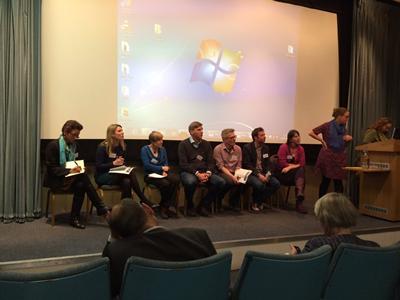New connections for NAMRIP members attending AMR workshop at Bristol Zoo

On Friday 22nd April, NAMRIP members Emma Roe, Charlotte Veal and Paul Hurley attended a social sciences and AMR workshop at Bristol Zoo Pavilion, led by ESRC AMR Research Champion Helen Lambert. The event was set up to further the development of interdisciplinary collaborations and knowledges, and potential research funding applications with a social science and AMR focus - especially pertinent for research addressing Theme 4 of the cross-Research Council initiative: ‘Behaviour within and beyond the health care setting’.
The day began with all present introducing their own research and expressing aspirations for development and collaboration within and beyond their current fields of interest. Researchers from universities across the UK were present, and we heard from experts across AMR research - microbiology (Matthew Avison), veterinary sciences (Gina Pinchbeck), infections and public health (Alasdair MacGowan) - about key questions in their fields. We were also given insightful perspectives from different disciplines in the social sciences - anthropology (Clare Chandler), economics (Jo Coast), development studies (Hayley Macgregor), geography (Steve Hinchcliffe) , international relations (Stefan Elbe/Simon Rushton), and sociology/science and technology studies (Sujatha Raman).
The Southampton gang were in attendance following NAMRIP's pump primer funding of our three-month, experimental project 'Preventing the spread of infection in hospital care settings: Health professionals, the agency of microbes and imaging tracking technology', a collaboration across Geography, Nursing, Microbiology and Engineering. Through the presentations we found some really interesting connections with other projects, including people working with hand hygiene, infection prevention, behaviour change and the visualisation of microbes. Fortunately none of this put us off our lunch, which provided not only much-needed nourishment but further opportunities to chat about AMR.

The afternoon sessions were spent in participatory workshop activities thinking through ideas around some of the key themes, challenges and insights of the research councils' upcoming call. Also present were Naomi Bennett from ESRC and Sam Lambshead from AHRC, who offered a reflective plenary to the day's discussions. This was followed by networking drinks and a free wander around the zoo - an unusual but fitting end to the workshop, and a chance to talk more relaxedly about AMR in the presence of fascinating nonhuman animals. Their global and interspecies perspectives were certainly valuable, prompting reflections and recontextualisations on some of what had been talked about throughout the day.
Photo of Social Science panel (left to right): Sujatha Raman, Clare Chandler, Hayley Macgregor, Stefan Elbe, Steve Hinchcliffe, Simon Rushton, Jo Coast, Naomi Bennett, Christie Cabral.
The research councils' call will be for both smaller pump priming grants and larger collaborative research grants addressing Theme 4 of the cross-Research Council initiative: ‘Behaviour within and beyond the health care setting’. Funders working in partnership on this call will be the Economic and Social Research Council (ESRC), the National Institute for Health Research (NIHR), the Medical Research Council (MRC), the Arts and Humanities Research Council (AHRC), the Department for Environment Food & Rural Affairs (Defra) and the Veterinary Medicines Directorate (VMD). This multilateral approach seems to reflect increasing public and political interest and investment in AMR globally.
Through this call, the research councils aim to expand understanding of how behaviour impacts on antimicrobial resistance relevant to both humans and animals across contexts and cultures, and how it can be influenced to create different future scenarios. The funders use a broad definition of behaviour and the scope of the call includes research relevant to the UK or global landscape and research of specific benefit to countries in receipt of official development assistance (ODA). They suggest that proposals should be highly collaborative, have a strong focus on real world impact and must be led by a UK researcher.
The research council representatives were very excited about this upcoming call, although still finalising some of the finer details. Full guidance on eligibility, closing dates and how to apply to the call will be published on the ESRC website in May 2016.